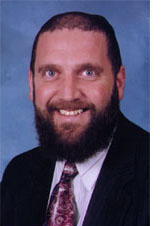
SAN DIEGO — Reb Yisroel Salanter, one of the greatest Rabbis of his generation, was set to say mourners kaddish in shul. At that shul, in those times, the custom was for only one mourner to say kaddish at each service. Reb Yisroel was designated for that particular service. Saying kaddish for a parent is a crucial and extremely emotional moment. There was another man in the shul that day who wanted very much to say kaddish, but he couldn’t because it had already been given to Reb Yisroel. When Reb Yisroel saw how forlorn the other person was, he gave up his right and allowed that other man to say the kaddish. When asked how he could give up the opportunity to do that important mitzvah for his parent, he said, “The chesed (kindness) of allowing that other man to say kaddish was a bigger mitzvah for my parent.”
It is heartwarming when we see the lessons of our sages practiced by our youth, as the following true story, submitted by Barry Itzkowitz, documented in Good Shabbos Everyone, illustrates:
Binyamin Newman began to prepare for his Bar Mitzvah. For six months Binyamin practiced reading the words and the proper sounds of his Parsha, so that on the Shabbos of his Bar Mitzvah he would be able to read it from the Sefer Torah perfectly.
When those six months were up, not only did Binyamin know it, so did everyone else in his family! On the bright and sunny morning of the Bar Mitzvah Shabbos, the Newman group – grandparents, greatgrandparents, uncles, aunts, cousins, and friends – gathered at the shul for davening (praying). Then Binyamin’s big moment arrived.
The Sefer Torah was taken out of the Aron HaKodesh (the holy Ark) and placed upon the Bimah, where the Torah is read. Binyamin and his father began to walk towards the Bimah from one side of the shul.
To everyone’s surprise, at the same time, another Bar Mitzvah bochur Shlomo Pam and his father began walking to the Bimah from the opposite side of the shul. The Pams were new in the neighborhood, and Mr. Rutkin, the Gabbai charge of the shul’s affairs, realized with a shock that he had completely forgotten Shlomo Pam’s Bar
Mitzvah was also that Shabbos. The Gabbai stood between the two Bar Mitzvah boys.
“I’m so sorry, I forgot that there are two happy occasions this Shabbos,” he said. “You both have practiced many long hours in order to be able to read parsha. Let’s divide the parsha between you.” Binyamin saw the disappointment in Shlomo’s eyes.
“Mr. Rutkin,” he said, “I would like Shlomo to read the whole parsha.”
“Why?” asked the Gabbai, surprised.
“After all….I won’t be any less a ‘Bar Mitzvah because I did not read,” said Binyamin with a smile. Then he leaned over, shook his new friend’s hand warmly and said, “Mazel Tov, Shlomy!”
One mother’s heart was filled with relief. “Shlomo worked so hard…,” whispered Shlomo’s mother Mrs. Pam to her sister, “The move to the new neighborhood has not been easy for him. He would have been devastated had he was denied his Bar Mitzvah moment.”
One mother’s heart was filled with pride. Binyamin’s mother Mrs. Newman whispered to her mother, “My ‘tzaddik.’ One who says ‘What is mine is yours, and what is yours is yours, is called a ‘righteous’ person (a tzaddik). Thank you, Hashem, for helping us bring up our son Binyamin to be such a man…”
After the Torah reading, Mrs. Pam rushed over to Mrs. Newman. “I can’t thank you enough for your son’s chessed (good deed). May Hashem repay you and your family many times over.”
Dedicated by Herb & Bette Shatoff in memory of their parents.
*
Rabbi Lederman is spiritual leader of Congregation Kehillas Torah in San Diego. He may be contacted at baruch.lederman@sdjewishworld.com